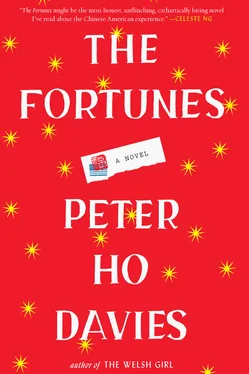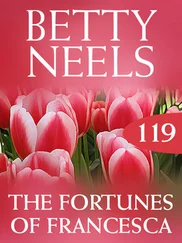RIVETING
In 1926, after the first spadeful of earth was turned with a golden shovel, she had the honor of driving the first rivet for Grauman’s Chinese Theatre. She’d starred alongside one of the theater’s backers, Douglas Fairbanks, in The Thief of Bagdad two years earlier. In yellowing press clippings she can be seen posing for photographers with a ball-peen hammer perched jauntily on her shoulder as if it were a golf club or parasol (though after she struck the first symbolic blows—“Chink, chink,” some card joked — a worker with a pneumatic hammer moved in to finish the job). The next day the caption in Variety called her a “riveting beauty.” She was twenty-one years old.
FIFTY MILLION FRENCHMEN
In Yokohama the newspapers catch up with their ship, with a juicy bit of Hollywood gossip. It’s 1935. Clark Gable’s Parnell is a bust, except in China of all places, and Carole Lombard has had some fun dropping fliers from a biplane over the MGM lot saying, “Fifty Million Chinese Can’t Be Wrong!” a reference to the Broadway smash of ten years earlier, Fifty Million Frenchmen, and its hit song.
It’s a coup. “Typical Carole,” she observes over the rim of her highball when people ask, though she envies Lombard her wit, and Gable a lover to make light of humiliation. If only she’d had someone. If only she’d thought to fly a plane over the studio. And what would she have dropped? A bomb, probably.
It thrills her fellow passengers, she can see, that they know her and she knows Carole Lombard, and it dismays her too, this reflected starlight that dims her own pallid glow.
Instead she makes a joke of it. It starts to do the rounds.
“Fifty million seagulls can’t be wrong,” someone kids at the rail; a flock hovers off the stern, taut as kites.
“Fifty million snowflakes can’t be wrong,” says another, flapping at his face, though snow hadn’t featured in any of their imaginings of Japan. But then it is January. If you squint, offers a wag, they look like cherry blossoms.
“Fifty million Japanese,” says someone else, staring out over the city, but what they can’t be is left unsaid, out of deference to her, perhaps. Fifty million Japanese can’t conquer China, she thinks to herself.
“Fifty million waves,” she offers gamely. In the steel-gray distance they seem as still as a photograph, waiting to be counted.
But most often she finds herself returning to those fifty million American moviegoers left in her wake. What can’t they? she wonders. See her kiss.
DARKNESS, INVISIBLE
She bought her first movie ticket at ten, with the tips she earned making deliveries for her father’s laundry. This was Los Angeles— Lo Sang in Chinese — her birthplace. Cutting school, she walked for miles in the heat to avoid being seen by anyone she knew. Only when she hadn’t passed another Chinese face for blocks did she duck into a theater — a Biograph, she later recalled. The ticket-seller gave her a narrow look, inspected the Indian head on the coin she held out as if it were a passport (this when Nickelodeons still cost a nickel), and waved her through. The ticket stub is preserved on the inside cover of her scrapbook.
At first she felt self-conscious, being the only Chinese, and a young girl at that, in the audience. She hid in the bathroom, terrified and lonely, tracing the pattern on the tin ceiling, until she heard the organist start up, and then she slipped in and took a seat. But in the cool darkness she found herself relaxing, laughing with the rest at the short subjects, weeping with everyone else during the feature, emotions she would never have betrayed on the street and which even here she glanced around furtively before giving vent to. But no one was watching her; all their faces upturned toward the screen, each one lit with the same silvery glaze. No one, not even she, could tell the difference. It was the first place she felt like an American.
When he found out her father made her kneel and beat her with the broom.
But she kept going, sometimes seeking out movie houses so far from home that the intertitles were in Spanish. Pearl White in The Perils of Pauline was a favorite — perils that included villains called Wu Fang and Long Sin. Her own villainy included forging notes from her father to give to her teachers in an English he couldn’t write, getting whipped first by him and then by them when discovered.
In the beginning it was the theaters’ thrill of invisibility that she craved, that she couldn’t get enough of, tired as she was of being stared at in the street, picked on in school. Outside, even the sun seemed to glare at her; inside, it was all chill shadows. The flickers were the one place she didn’t feel watched, the one place where she could watch others. Later, though, she came to envy those faces and figures on the screen before her. Not to be stared at was one thing, but to be stared at as they were stared at, with love and awe, was something else again. She wanted to be like them. Every face on the screen was white, but in the dreaming darkness anything seemed possible. At home in the mirror she practiced their expressions and poses awkwardly. But in the dark she made their faces her own.
ORIENTALLY YOURS
She turns heads on the boat deck. She turns heads on the lido deck, reclining beside the saltwater pool. She signs autographs in the beauty shop, at the soda fountain, at the bar. “Orientally yours,” she writes, then her name, Anna May Wong, in English and Chinese, Wong Liu Tsong. She’s the only Chinese in the First Cabin. She turns heads at the captain’s table. She turns heads in the salon. The ballroom is as big as a soundstage. Men scramble to pull out chairs for her. She’s a dab hand at quoits.
A woman in furs is reading The Good Earth on the promenade deck. Would she sign it? A passing steward proffers a pen. She pushes up her sunglasses, fogged with salt rime. “I heard Pearl Buck wanted you for the part,” the woman says, and she nods as if this matters. “Good Earth, Better Sea!” she inscribes gaily on the flyleaf.
The ship is the SS President Hoover, named for the thirty-first president, a one-time manager of the Chinese Engineering and Mining Company. Mr. Hoover served honorably in the defense of Tientsin during the Boxer Rebellion. Later he helped ship fifty thousand coolies to South African mines. It is said the president and first lady spoke Mandarin in the White House whenever they wanted to communicate privately. Their portrait hangs over the grand staircase of the steamliner.
Out of Yokohama she visits steerage and finds it filled with Chinese, stacked in bunks, many of them old, their faces freckled and pouchy, on their way home after a lifetime away. She tells them she is visiting her father, who has moved back to his ancestral village, and they smile toothlessly, nod in approval. They are bringing home treasures. They show her radios, bicycles, wristwatches. They show her the prized canaries they are bringing as gifts for family, the birds cowering mutely on their perches like their owners on the edge of their bunks. Through the hull she can just make out the dull reports of first-class passengers shooting skeet off the stern. One younger man clutches a box tightly to his chest, and when she asks what’s in it, he tells her the bones of his father. She signs autographs for them but omits the “Orientally yours.”
Later, alone in her suite de luxe, she sips her nightcap, lies back on satin pillows plumped by the maid, loses herself in the lustrous grain of the burled, inlaid ceiling, while her fingers trace the mazy scrollwork of the dado rail.
Wong Liu Tsong means “Frosted Yellow Willow.” Her father asked her once what Anna May meant. “Me,” she said simply.
Читать дальше












